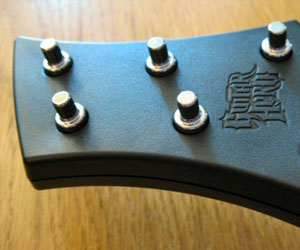Guitar Pegs FAQ
The physics behind tightening and loosening guitar strings to change their pitch when strummed are pretty simple properties: finding the best guitar tuning pegs is not always as easy to follow. While some recommend going directly through a manufacturer's catalog for guitar parts, the truth is, many parts are replaceable using third party manufacturer products! Machineheads are among the parts on a guitar that can be picked up reasonably cheap through a manufacturer that exclusively makes replacement guitar parts. Other kinds of pegs and guitar parts that may be available at a discount over what you'd get through your guitar company include:
- Guitar strap pegs
- Guitar bridge pegs
- Guitar straps
- Tuning knobs
Questions about getting machineheads for your guitar pop up all the time. Here are a few answers to keep you shopping in confidence.
What Is the Importance of My Machineheads?
Because the machinehead is the part of the guitar that both tunes the string it is assigned and also keeps the string taut to prevent pitch bending, it is an extremely important piece on any guitar. If you have poor quality machineheads, you may find your instrument getting out of tune reasonably quickly under less than heavy playing. By upgrading or replacing your machineheads, you’ll be able to stay in tune longer with better tone throughout.
What Should I Do If I Break My Bridge Nut?
A bridge nut is the piece at the top of the neck that feeds the strings to their machineheads and keeps them in place. If you break this vital piece, all of your strings will lose tension and you’ll be unable to play. Replacing one is as easy as cleaning out the cavity where the old bridge nut was with a chisel then using apoxy to seal a new bridge nut in place. Often repair shops will do this at a fee but the fix is incredibly simple.
Is There a Difference Between Brands of Guitar Heads?
There are different brands that produce guitar heads just as many as there are brands of guitars themselves. Often guitar manufacturers will produce excess parts for their models to ensure that people can buy replacement parts immediately when needed. Yamaha, Gibson and more have guitar heads available that range in style and application. Some guitar heads are very large, which yields for a wider range in tonal shift with each complete revolution. Others are smaller but fancy-looking: pearl and glistening gold coating make for great classical trim works on a beautiful guitar.
Ultimately, the difference between brands of guitar heads is varied depending on the brand and product. If you’re looking for a standardized guitar head, there are simple versions available at wholesale prices. If you need a specific kind such as an “inline six”, chances are you’re going to pay a bit more but get the specific product that you need. Guitar heads are as different as guitars themselves but the best one for you will depend on what your style of playing is.

